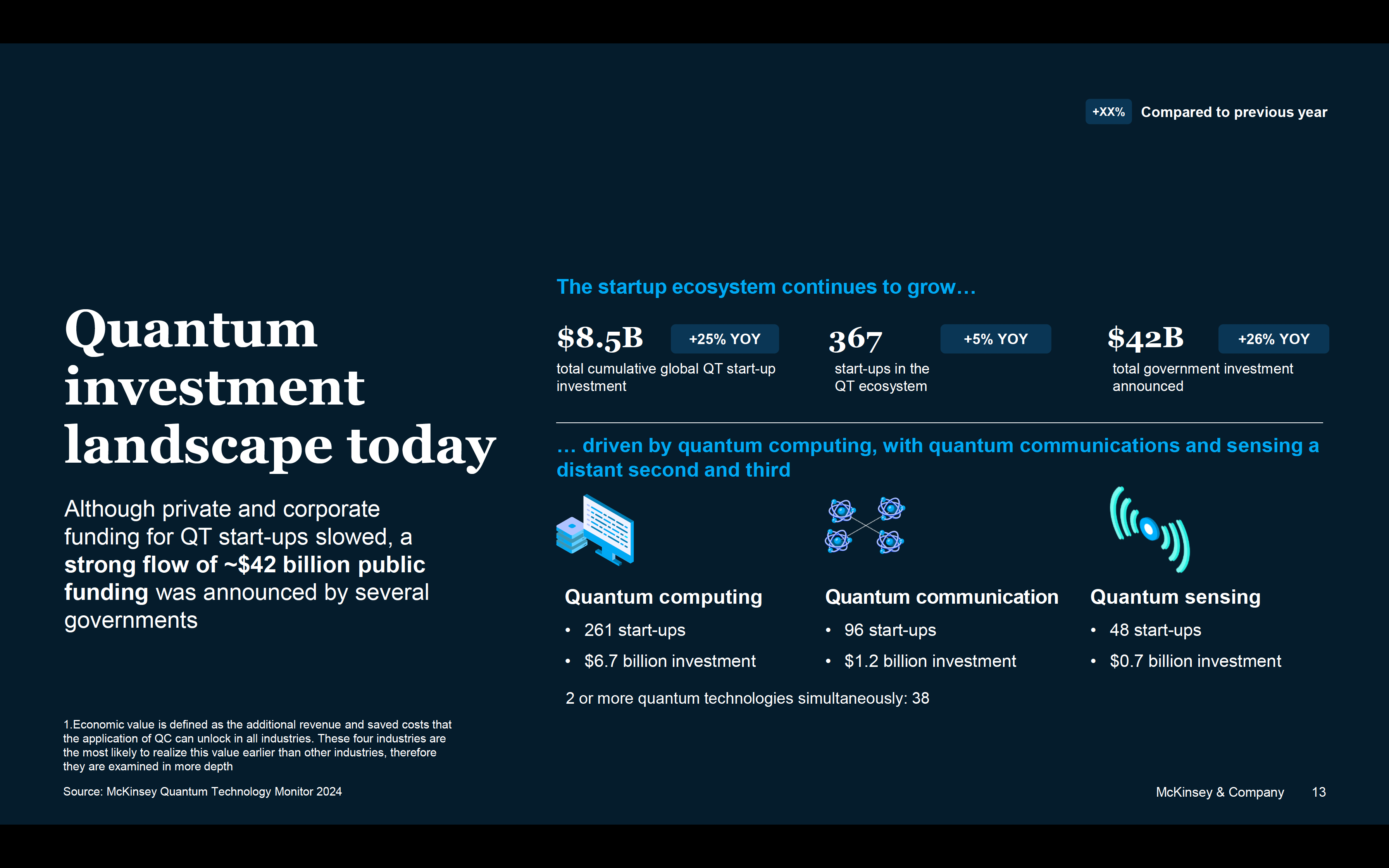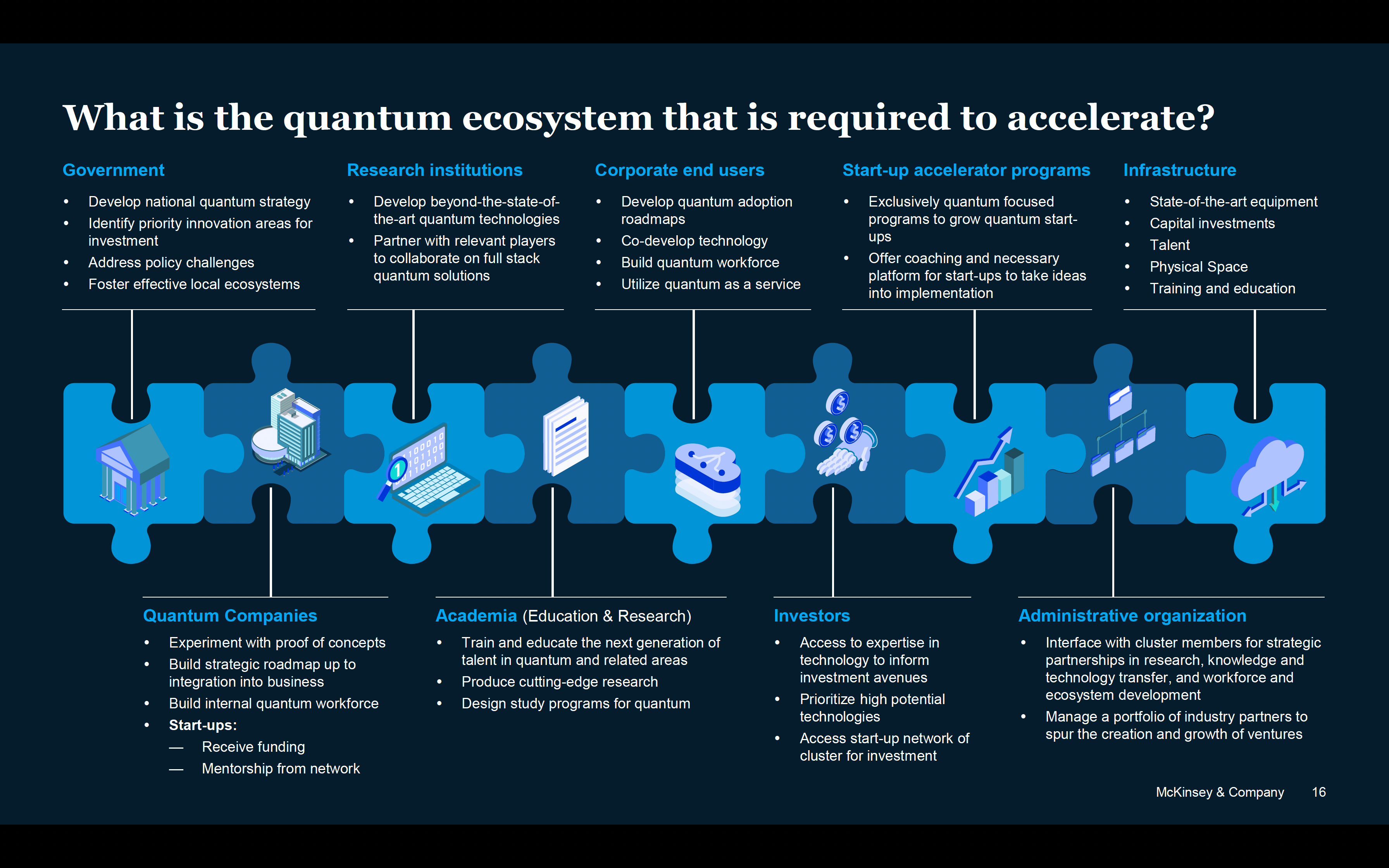Many of you are already familiar with Silicon Catalyst and the value it brings to semiconductor startups, the industry and the electronics industry at large. Silicon Catalyst is an organization that supports early-stage semiconductor startups with an ecosystem that provides tools and resources needed to design, create, and market semiconductor solutions. It is the only incubator + accelerator focused on the Global Semiconductor Industry and operates with the motto “It’s about what’s next.”
Overall Tech Trends: Inspiration for Quantum and beyond
In keeping up with its motto, Silicon Catalyst invited Dr. Mena Issler from McKinsey and Company to talk about Frontier Technology Trends, at its recent Q3 Advisor & Investor meeting. Mena is an Associate Partner at McKinsey & Company and is one of the authors of “
![]()
Some Highlights from Mena’s talk
In 2023, technology equity investments fell by 30-40% to around $570 billion due to rising financing costs and cautious growth outlooks. Despite this, investors are focusing on technologies with high revenue potential, recognizing the long-term value in diversifying investments across multiple tech trends.
Generative AI (gen AI) has emerged as a standout trend, seeing a sevenfold increase in investments since 2022. Its capabilities have expanded dramatically, with large language models (LLMs) now able to process up to two million tokens, powering advancements in text, image, video, and audio generation. Gen AI is being integrated into enterprise tools for diverse applications such as customer service, advertising, and drug discovery, fueling a broader AI revolution and spurring innovations in applied AI and machine learning.
Gen AI’s rapid evolution is also driving advancements in robotics, with AI-powered robots becoming more capable and widely deployed across industries. Robotics was added to McKinsey’s 2023 tech trend analysis, reflecting its growing significance as AI technologies improve and expand robotic capabilities, making automation smarter and more efficient.
Job postings for tech-related roles declined by 26% in 2023, largely due to layoffs in the sector. However, trends like Gen AI continued to see demand for talent, with overall tech job postings up 8% from 2021, indicating long-term growth potential. Interest and innovation across 15 key tech trends remain strong, with AI and renewable energy leading the charge in Investment growth and overall investment, respectively.
This is all food for thought as we start to build and prepare for quantum and semiconductor’s future. To learn more about the latest tech trends, check out the McKinsey report.
Quantum Technologies
With the bulk of technology news these days centered around Artificial Intelligence (AI), it is easy to lose sight of other fast advancing technologies and trends. One such space is the field of quantum technologies. Silicon Catalyst stays on top of things through various means with the incubator’s annual Silicon Startups Contest conducted in partnership with Arm – being one. The overall top winner of the 2023 Contest, conducted by Silicon Catalyst in partnership with Arm, is Equal1, a quantum computing company from Ireland. Over the last two quarters, Silicon Catalyst has received a flurry of quantum space applicants to its incubator program. A couple of recent applicants are currently going through the review process for consideration for admittance into the incubator.
Quantum Computing utilizes quantum properties to process information and perform simulations, offering exponential performance improvements over classical computers in specific applications.
Quantum Communication involves the secure transfer of quantum information over distances, using optical fiber or satellites, with potential to ensure secure communication even against quantum computing attacks. Quantum Key Distribution (QKD) is a secure communication method using quantum technology to protect data against potential attacks by quantum computers.
Quantum Sensing enables ultra-sensitive measurements of physical quantities, surpassing classical sensors in accuracy, with applications in navigation, bio-imaging, and semiconductor manufacturing.
Recent Developments
Recent developments in quantum technologies include significant progress in error correction, full-stack integration, information security, and partnerships. Harvard, MIT, QuEra, and NIST demonstrated algorithms on 48 logical units with error rates below 0.5%, and Microsoft and Quantinuum achieved four reliable qubits with an error rate below 0.01%. IBM and Google also advanced in logical qubit storage and error reduction. These steps push the field toward higher-quality, scalable qubits.
In cybersecurity, companies are strengthening encryption systems to counter potential quantum threats, particularly “harvest now, decrypt later” attacks. Postquantum cryptography is being deployed as a proactive defense.
Bridging Quantum Technology and Real-world
Start-up partnerships with conventional enterprises are also expanding, such as Rolls-Royce’s collaboration with Riverlane to develop quantum algorithms for material discovery in hostile environments. Such partnerships aim to bridge the gap between quantum technology and real-world applications.
Quantum Ecosystem Required to Accelerate Market Growth

While investments into quantum technology startups, the number of such startups and the total governmental investments toward quantum all increased year-on-year, there are still many challenges to overcome. An elaborate and strong ecosystem is needed to catalyze growth and market adoption of quantum technologies. The chart from McKinsey & Company, below identifies the various partner categories required of such a quantum ecosystem.

Summary
For any entrepreneur with a groundbreaking idea in semiconductor technology, Silicon Catalyst offers the ideal environment to turn that idea into reality. Through its extensive network of partners, advisors, mentors, and industry resources, it provides startups with a unique advantage in navigating the complexities of semiconductor development. By joining Silicon Catalyst, startups not only gain access to essential tools and expertise but also become part of a global network that is driving the future of technology.
As for what is next, Silicon Catalyst is looking to build out an ecosystem of design tools, refrigeration systems and cryostat equipment to support and nurture early stage startups in the quantum space.
To learn more, visit SiliconCatalyst.com. You can meet Silicon Catalyst Partners at the Quantum to Business (Q2B) conference, December 10-12, 2024 at the Santa Clara Convention Center. Those interested in further information about Silicon Catalyst-Quantum activity, please send a note to quantum@sicatalyst.com to receive a special Q2B conference registration discount from Silicon Catalyst.
Also Read:
Silicon Catalyst Ventures Launched With 8 Fundings
Silicon Catalyst Announces Winners of the 2024 Arm Startups Contest
A Webinar with Silicon Catalyst, ST Microelectronics and an Exciting MEMS Development Contest
Share this post via:





Comments
There are no comments yet.
You must register or log in to view/post comments.